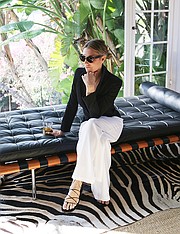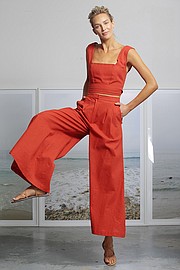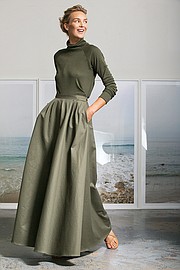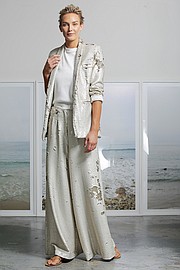Heidi Merrick Develops Her Own Formula for Fashion Success
Fashion
As of Thursday, January 31, 2019
Los Angeles–based Heidi Merrick was known from the start as an artist who envisioned designs that were far beyond popular trends.
The designer—whose H. Merrick of California shop is located on West 9th Street in downtown Los Angeles—hails from the family that started Channel Island Surfboards in Santa Barbara, Calif. It was founded by her father, Al, and mother, Terry, in 1969. Beginning her career as a stylist in New York, Merrick took art classes at night and supplemented her income by teaching chess. The designer now breaks fashion rules by following her instincts and explains her style in this interview with the California Apparel News.
When did you decide you wanted to be a fashion designer and why?
After my wedding—I made my wedding dress—everyone said, “You’re wasting your life, you should be making dresses.”
How did you make that happen?
I went to L.A. Trade-Tech [Los Angeles Trade-TechnicalCollege] to learn how to make patterns and sew. When I was graduating, one teacher said, “No one is going to hire you. You have a really strange thought process.” I burned the hems on some of my dresses. I liked to do what I liked to do. The teacher was right. She said, “I think you can start your own collection.” So I did.
Who was the person who helped you the most in becoming a fashion designer?
My husband endured me working really hard. I’ve been in this studio for 10 years, before I had kids. I would be here until 12 at night. It was my passion.
Looking back on your first collection, what was it like and how would you change it now?
I would change fits because I know more now. I used to make dresses that had an almost couture fit, not with ready-to-wear in mind. Coming out of design school, I think it takes a long time to grasp the concept of ready-to-wear. That has been my journey—making something that feels bespoke in ready-to-wear.
What are the biggest challenges you find in creating a collection and how do you overcome them?
With every collection there is an 11th hour when you say, “Nothing is working. This is not good.” Now, I am on my 45th collection and I say “I am at the 11th hour, and I am not going to over-make the collection. It will sell or not, but it will not change my life.”
Where do you get your inspiration?
This is a funny collection. While at our family’s pool party, a girlfriend of mine kept saying, “Now that I summer in Europe…” or “Next year, when I summer in Europe…” So I named my collection “Now That I Summer in Europe.” This collection, which is coming out in a month reflects a California girl in Europe. It’s always a little cheeky but from a real impulse.
What is your favorite part of being a fashion designer?
Any hobby or sport, when you get into the work of it, it’s meditative and profound. It takes so much time that it shapes the way you think about the clothes.
What skills are necessary to be a good fashion designer?
You need to be tenacious and have a strong head. You need to know that you have a vision, even if you can’t articulate it. If you’re limited by what you’ve told someone you’re going to do, you’re done before you started. You have to be able to let your mind wander to be successful.
How would you describe your personal style?
A grown-up surfer girl who has done well for herself and dresses well but still wants to look cool.
What is the best and worst feedback or critique you have received and from whom?
The best feedback always comes from the women who wear the clothes—“I kept it. I’ve worn it for 10 years. I’ll wear it forever.” The worst comes from your sales team bringing back what buyers say to you.
How has the Los Angeles fashion industry changed since you started?
It ebbs and flows. There have always been great designers in Los Angeles, going back to the designers and skilled artisans working with the movie stars in the 1950s. In my opinion, people who want a really nice lifestyle and love fashion live in L.A. It’s a glamorous community.
What advice would you give to emerging designers?
Don’t lend your magnificence to an institution that doesn’t recognize you as equal.



